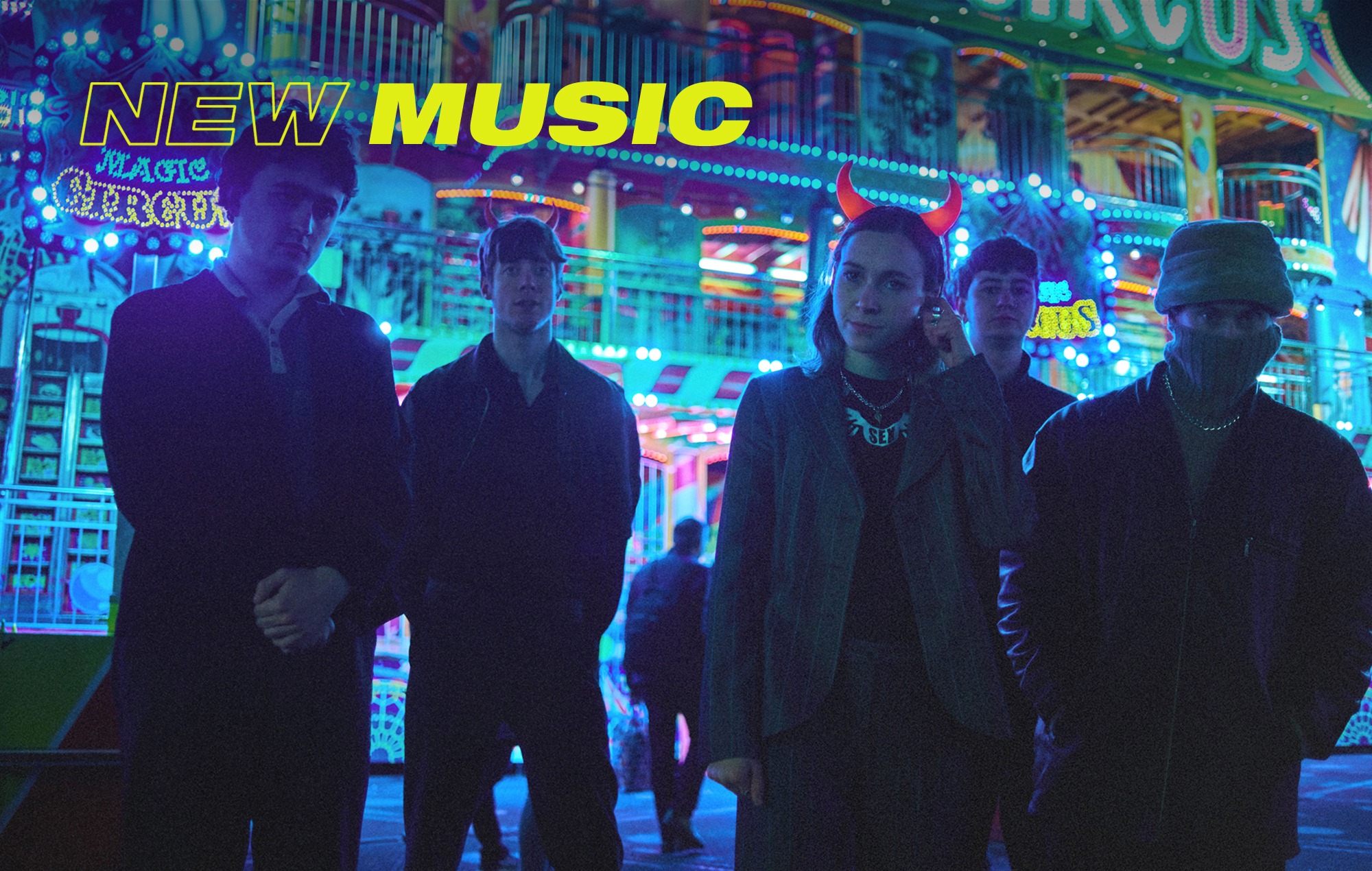
Sorry: Domino-signed London band’s debut album may well be the year’s most striking
When NME speaks to Sorry’s Asha Lorenz and Louis O’Bryen, the news of the cancellation of this year’s SXSW Festival in Austin, Texas due to the coronavirus outbreak is still fresh. An awful lot of people — musicians, music industry workers, dedicated music fans — are distraught about it: not only will the cancellation hit the industry hard financially, SXSW is arguably the most important global event on the new music calendar.
Yet London-based Sorry, who were due to play, are trying to not let it get to them. “Yeah, obviously that’s not happening anymore,” Louis says, his laconic tone disguising his disappointment about their SXSW plans. “But we’re still doing shows in New York and LA, so we’re still really excited.” While the band did make it to their New York show, their LA gig was postponed due to the ongoing health crisis.
But both here and abroad, Asha and Louis – along with drummer Lincoln Barrett, bassist Campbell Baum and, lately, keys player Marco Pini – have been an intriguing and slippery proposition in the capital’s DIY music scene since they first formed under the name Fish in 2016. Their first gig was on a boat in the East End for the inaugural Slow Dance, a series of events that developed into one of the capital’s most distinctive underground arts collectives of which Marco was a founding member.
That crew’s reputation for genre-melding experimentation precedes them, and a similar spirit of creative restlessness runs all the way through Sorry’s spectacular debut album ‘925’, which is set for release via Domino on March 27.
“We listen to loads of different genres,” Asha says. “But people in general listen to loads of different genres now, without it being tied to your personality in the same way.”
“Marco’s been our friend for years — before any of us got into doing music stuff,” Louis adds. “We’ve always been doing stuff with him. Slow Dance are doing really well, Marco puts out so much cool music [under the name GLlows] and it’s encouraging to see one of your peers doing so well.”
Asha and Louis go back a long way. Having first met at school, the pair began making music together as they got older and started to develop the initial elements of what would become Sorry. At first, the pair wrote their songs troubadour-style, figuring each one out chord-by-chord on guitar. They then expanded those creations into a full-band arrangement once Lincoln and Campbell joined, and they soon began writing as a quartet. But it was only when they started introducing electronic elements to their songwriting that much of the Sorry sound we hear on ‘925’ really started to come together.
“We started using the computer,” Louis recounts. “We always liked it, and it was a way of making things more interesting.” Both he and Asha have an endearingly reverent way of talking about “the computer”, like kids who’ve just been given an endlessly fun but worryingly delicate new toy.
“We wrote lots of the early songs together with the full band, and the computer songs were separate,” says Asha. “It’s only in the last couple of years that we started writing from home, and transferred them from the bedroom to the band. We wanted to merge the two things together a bit: that’s what we tried to do with the album, and how we’re writing now.

“It took some time for us to realise what we liked and didn’t like,” she adds. “But now we know what we’re doing. It’s easier on the computer ‘cos we can just load up the songs and stuff.”
Across ‘925’ intricate details, as subtle as they are inventive, swerve in and out of view and provide a kind of punctuation to this fluid collection of songs. Asha’s “bleeerrghhh” on ‘Starstruck’, for example, snaps the track’s stumbling chorus back into place just as it threatens to collapse in on itself; the guttural sound somehow far more impactful than the kind of drum fill or guitar turnaround that most rock bands would deploy in its place. These are the kind of touches that set this band apart from their peers. Their music often feels far more hand-crafted and artisanal than the more down-the-line, boilerplate garage punk that’s so in vogue at the moment.
“Those things just come out,” Asha says. “Like in a demo, when you keep listening to it, it’s the little things that make it addictive. If you take them out it can be really boring. We try and put a lot of little bits in.”
Louis agrees. “A lot of that comes from starting it at home, because we have control over what’s going on with the computer rather than having a producer there from the start, so we can mess around with it and cut stuff up.”
It makes sense: ‘925’, though polished and audibly the product of a shit-hot band that’s matched up to an excellent label, retains a certain handmade quality. “It’s good that we have some money to go in the studio,” Asha concurs. “But we don’t really like doing it that way. But [Domino’s] a really nice label, and they’ve helped us a lot,” she adds.
Sorry’s visuals also have that entrancing mix of the polished and the DIY, and it’s this point in our conversation where Asha becomes the most animated. “We started making videos when we made the mixtapes because it was fun,” she says enthusiastically. “But we’ve kept doing it because it helps us make sense of the songs. It might not even be about the meaning, but just the colours and stuff can help you experience the song.
“The music’s got different genres in it, so the artwork helps keep it all together. Sometimes we’ll write a song with an image already in mind, but it doesn’t mean that vision is what the video will [ultimately] be — it can just be a colour or whatever.” She pauses abruptly. “It’s not cult-y vibes.”
Asha and Louis have a rare way of seeming relaxed, artistically focused and curious all at once. ‘925’, a complex, shape-shifting and mysterious record, is a musical statement that reflects all of those things and more. The music industry may be in limbo at the moment, but it seems like Sorry, at least, are in a very good place.




